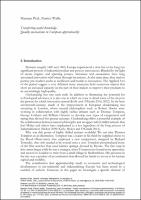Chapter Transferring useful knowledge. Quality mechanisms in European apprenticeship
| dc.contributor.author | Prak, Maarten | |
| dc.contributor.author | Wallis, Patrick | |
| dc.date.accessioned | 2023-08-03T15:02:48Z | |
| dc.date.available | 2023-08-03T15:02:48Z | |
| dc.date.issued | 2023 | |
| dc.identifier | ONIX_20230803_9791221500929_20 | |
| dc.identifier.uri | https://library.oapen.org/handle/20.500.12657/74824 | |
| dc.description.abstract | Human capital is central to current debates about the sources of growth and divergence in the premodern economy. Apprenticeship, the key formal arrangement by which occupational skills were transferred in this period, has in the past often been associated with guild monopolies and exclusion, implying a drag on the accumulation of human capital. Several stimulating recent contributions have pointed to apprenticeship as a potentially important explanation for English or European advances in manufacturing and technology in the run up to industrialisation. In this paper, we explore mechanisms that helped improve quality among artisans. We focus on one in particular: the selection of training masters by apprentices. | |
| dc.language | English | |
| dc.relation.ispartofseries | Datini Studies in Economic History | |
| dc.subject.classification | thema EDItEUR::J Society and Social Sciences::JH Sociology and anthropology::JHB Sociology | en_US |
| dc.subject.other | Apprenticeship | |
| dc.subject.other | Human Capital | |
| dc.subject.other | England | |
| dc.subject.other | Netherlands | |
| dc.subject.other | Skill | |
| dc.subject.other | Artisans | |
| dc.subject.other | Technology | |
| dc.subject.other | Guild | |
| dc.title | Chapter Transferring useful knowledge. Quality mechanisms in European apprenticeship | |
| dc.type | chapter | |
| oapen.identifier.doi | 10.36253/979-12-215-0092-9.11 | |
| oapen.relation.isPublishedBy | bf65d21a-78e5-4ba2-983a-dbfa90962870 | |
| oapen.relation.isPartOfBook | 9f9bbbdd-c500-4575-9865-db2693689bc1 | |
| oapen.relation.isbn | 9791221500929 | |
| oapen.series.number | 3 | |
| oapen.pages | 16 | |
| oapen.place.publication | Florence |

